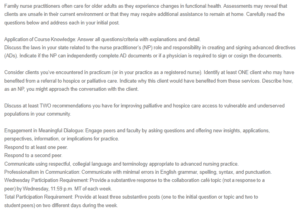Discussion – Family Nurse Practitioners
Laws in Florida Related to the Nurse Practitioner’s (NP) Role
NPs in my state, Florida, are subject to rules that restrict their role and obligations in developing and signing advanced directives (ADs). The Florida Health Care Surrogate Act is one such statute. The Florida Health Care Surrogate Act authorizes NPs to act as healthcare surrogates for patients who have designated them, which is a crucial component of advanced care planning. According to the Florida Medical Permission Law, NPs can obtain informed permission from patients for medical operations, including those involving advanced directives (Pope, 2022). However, in Florida, NPs are not permitted to complete or sign AD forms on their own. While nurse practitioners play an important role in educating and aiding patients in developing their advance directives, a physician’s signature or co-signature is usually required to make these documents legally binding.
Clients Encountered With In Practicum
As a registered nurse, I encountered a patient in their late 70s with advanced metastatic cancer and multiple underlying chronic diseases. This patient’s health had been rapidly deteriorating, resulting in repeated hospitalizations and a decrease in overall quality of life. As an NP, I would approach the dialogue with respect and empathy, ensuring that the patient and their family understand their prognosis as well as the potential benefits of hospice or palliative care. I would talk about the extensive and specialized support offered through these services, which can include pain and symptom treatment, emotional and psychological support, and the chance to spend quality time with loved ones.
Recommendations for Improving Palliative and Hospice Care Access
Two recommendations can be made to improve access to palliative and hospice care for vulnerable and underprivileged groups in my community. First, through community outreach and education campaigns, it is critical to create awareness about these services. This can help clarify myths and minimize the stigma typically associated with end-of-life care, making people more willing to seek palliative and hospice care. Next, it is critical to improve coordination among healthcare practitioners, social service providers, and community organizations (Doty et al., 2020). We can better assure fair access to palliative and hospice care by developing a network of care that meets not only the medical but also the social, emotional, and financial needs of these people, particularly those suffering economic and cultural constraints.
References
Pope, T. M. (2022). Is consent required for clinicians to make a determination of death by neurologic criteria? In Advances in Neuroethics (pp. 287–303). https://doi.org/10.1007/978-3-031-15947-3_21
Shavelson, L., Pope, T. M., Battin, M. P., Ouellette, A., & Kluger, B. (2022). Neurologic diseases and medical aid in dying: Aid-in-dying laws create an underclass of patients based on disability. The American Journal of Bioethics, 1–11. https://doi.org/10.1080/15265161.2022.2105422
ORDER A PLAGIARISM-FREE PAPER HERE
We’ll write everything from scratch
Question
Family nurse practitioners often care for older adults as they experience changes in functional health. Assessments may reveal that clients are unsafe in their current environment or that they may require additional assistance to remain at home. Carefully read the questions below and address each in your initial post.

Discussion – Family Nurse Practitioners
Application of Course Knowledge: Answer all questions/criteria with explanations and detail.
Discuss the laws in your state related to the nurse practitioner’s (NP) role and responsibility in creating and signing advanced directives (ADs). Indicate if the NP can independently complete AD documents or if a physician is required to sign or cosign the documents.
Consider clients you’ve encountered in practicum (or in your practice as a registered nurse). Identify at least ONE client who may have benefited from a referral to hospice or palliative care. Indicate why this client would have benefited from these services. Describe how, as an NP, you might approach the conversation with the client.
Discuss at least TWO recommendations you have for improving palliative and hospice care access to vulnerable and underserved populations in your community.
Engagement in Meaningful Dialogue: Engage peers and faculty by asking questions and offering new insights, applications, perspectives, information, or implications for practice.
Respond to at least one peer.
Respond to a second peer.
Communicate using respectful, collegial language and terminology appropriate to advanced nursing practice.
Professionalism in Communication: Communicate with minimal errors in English grammar, spelling, syntax, and punctuation.
Wednesday Participation Requirement: Provide a substantive response to the collaboration café topic (not a response to a peer) by Wednesday, 11:59 p.m. MT of each week.
Total Participation Requirement: Provide at least three substantive posts (one to the initial question or topic and two to student peers) on two different days during the week.
rubric
Application of Course Knowledge
3 Required Criteria
Answer all questions/criteria with explanations and details:
1. Discuss the laws in your state related to the nurse practitioner’s (NP) role and responsibility in creating and signing ADs. Indicate if the NP can independently complete AD documents or if a physician is required to sign or cosign the documents.
2. Consider clients you’ve encountered in practicum (or in your practice as a registered nurse). Identify at least ONE client who may have benefited from a referral to hospice or palliative care. Indicate why this client would have benefited from these services. Describe how, as an NP, you might approach the conversation with the client.
3. Discuss at least TWO recommendations you have for improving palliative and hospice care access to vulnerable and underserved populations in your community.

